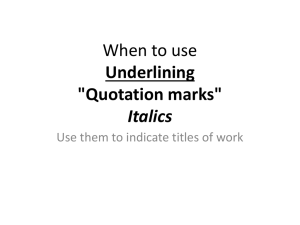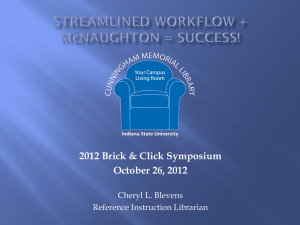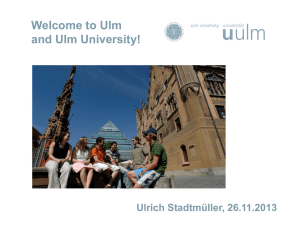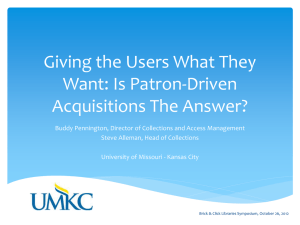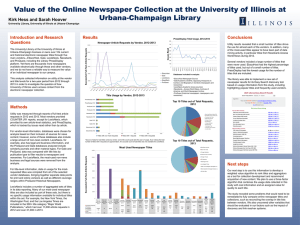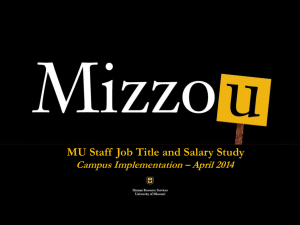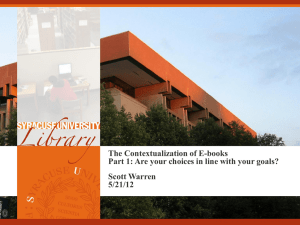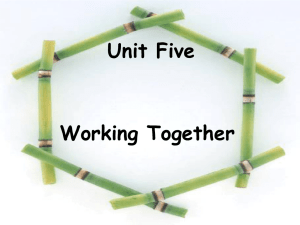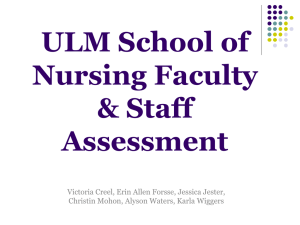The ULM Library Deselection Project
advertisement
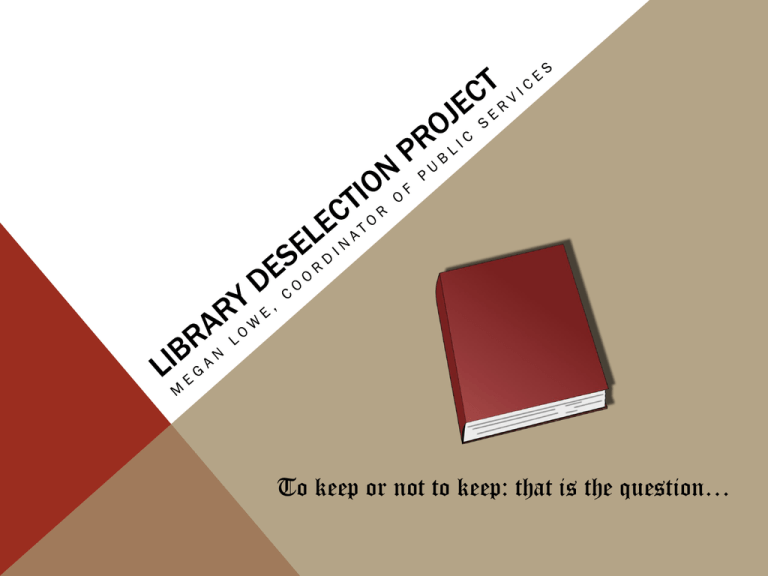
To keep or not to keep: that is the question…
INTRODUCTIONS – YOUR HOST
•
Coordinator of Public Services/Reference Librarian/Associate Professor
•
Worked at ULM since 2003 (started as a reference librarian)
•
Tenured in 2009; promoted to the rank of Associate Profession in 2011
•
Master’s of Library & Information Science (MLIS), 2002
•
Master of English, emphasis in Creative Writing (MA), 2008
•
Worked in libraries in one capacity or another since 1997
•
Wearer of many hats and balancer of many things
•
A human being with feelings, just like you
WHAT IS DESELECTION?
•
Deselection is basically unselecting or removing titles from a collection.
•
It is also called weeding.
•
It is a ‘natural’ part of collection maintenance and should occur regularly
•
Collection development policies (including the ULM Library’s) contain
sections on deselection and how it should be performed.
•
The current project is different from routine deselection efforts in that it
is a special project and therefore requires different parameters.
•
Nevertheless, it is important to understand that the health of a library’s
collection depends as much on deselection as it does selection.
^ ULM
{The real question on everybody’s mind}
SO…WHAT IS THE ULM LIBRARY DOING ANYWAY?
• The fastest answer is that the Library is making way for new things.
• The longer answer is that the Library has been asked to transition to a
digital library model and, to support that effort, two floors’ worth of
books are being removed to make way so that smart classrooms and
technology-enabled seminar and study rooms can be built.
• The digital project was initiated by campus administration and has the
support of the Library.
• Many of the details of the digital library are still being hammered out, but
the first action step the Library needed to take was the reduction of the
collection.
• Frankly, the deselection of the ULM library collection is LONG overdue.
HOW IS DESELECTION CARRIED OUT?
•
Part of a librarian’s training – regardless of what their specialty is –
involves collection management and development, including selecting
and deselecting.
•
This means there are criteria for the deselection just as there are for
selection.
•
However, while the selection of titles is often accomplished with input
from the campus community, it becomes more difficult to incorporate
input into the deselection process – this is why the Library did not
initially solicit the campus community for assistance or input.
•
We have, in response to faculty concerns, implemented a faculty input
mechanism into the process (but more on that shortly).
HOW IS DESELECTION CARRIED OUT? CON’T.
•
A set of deselection criteria were developed to guide the decisionmaking process on the part of the deselectors.
•
Titles which are damaged, have duplicates, or have been superseded by
newer editions are being removed without consultation.
•
Titles which are being considered for removal based on the deselection
criteria are made available to faculty for review so that faculty can
indicate titles which they would like retained (more on this process
shortly).
•
Once titles have been identified for deselection, they are disposed of
(more on that later).
(I won’t bore you with the technical details of the process, don’t worry!)
DESELECTION CRITERIA
Titles which have not shown significant circulation since 1999 (i.e., 1-2
check-outs since 1999).
Titles which have not shown significant in-house use since 1999 (i.e., 1-2 inhouse uses since 1999).
Titles which are in very poor condition (i.e., beyond repair or show signs of
mold) regardless of circulation/in-house use.
In STEM disciplines, bear in mind that their usual cut-off date for currency in
research is the most current 5 years (this includes health sciences
disciplines as well).
DESELECTION CRITERIA, CONTINUED
For titles about which you are uncertain, check those titles against the
Resources for College Libraries (currently housed in Barbara Pruitt’s old office
in the Admin Suite on the 4th floor).
Be sure to consult with your colleagues, especially if the title might have
applications in other departments for which you aren't the liaison.
Bear in mind the existing curricula, degree programs, and their levels of
degrees of your liaison departments (i.e., do they offer a major? Do they offer
a bachelor’s level degree only, or do they offer more advanced
degrees/certifications?).
FACULTY INPUT MECHANISM
•
Traditionally, deselection is carried out without consultation outside of the
library because of the quotation posted below from President Abraham
Lincoln, adapted from the poet John Lydgate.
•
The more feedback the library gets, the more difficult it becomes to identify
titles that need to or ought to be removed for legitimate reasons.
•
Frankly – for good or ill – people are very passionate about libraries and
books, and this, too, complicates the process for the Library.
•
The ULM faculty expressed concern and a desire to assist with the process,
so a faculty input mechanism was developed by the ULM Library and
approved by the ULM Library Committee (an advisory committee composed
of non-library faculty/staff).
“You can please some of the people all of the time, you can
please all of the people some of the time, but you can’t please all
of the people all of the time.” ~ President Abraham Lincoln,
adapted from the poet John Lydgate
FACULTY INPUT MECHANISM: HOW IT WORKS
•
Librarians pull books which meet the aforementioned criteria and change
their status in the Catalog to “LIMBO.”
•
These books are placed in the Monroe Garden Study League Room
(MGSLR) on the 5th floor of the Library and a list is generated of those
titles and posted on the Deselection website.
•
Faculty have a week to EITHER (1) review the titles ‘manually’ in the
MGSLR and identify titles for retention using pink slips of paper which are
available in the room –OR- (2) review the list posted on the website and
identify titles on the list for retention and email the list to me.
•
Titles identified for retention are restored to the Catalog and to the
shelves; the rest of the titles are disposed of in accordance with the state
laws which govern public institutions in Louisiana.
pull books
faculty
review
books
processed
DISPOSITION OF TITLES
•
We have been asked why the Library does not donate, sell, or recycle titles
which are not going to be retained; we have also been asked if what we are
doing is legal.
•
The answer to the first question is related to the second question, but the
second question must be answered first: yes, it is legal.
•
Public institutions, including public university libraries, are governed by
certain legislation.
•
Under that legislation, the Library is not permitted to *DIRECTLY * donate
books, especially if the books may be sold.
•
The Library cannot sell the books either.
•
As far as recycling goes: we lack the resources to process the books to
prepare them for recycling, nor do we have the resources to pay for such a
service.
DISPOSITION OF TITLES, CONTINUED
•
Therefore, the Library has two options when it comes to dealing with
titles which will NOT be retained: offer them to the public *OR* discard.
•
The Library offers titles which are in good shape to the public on the
“FREE KITTENS” table on the first floor of the Library (under the stairs).
•
Titles in poor shape or otherwise no longer useful (like membership
directories from the 1960s) are discarded to the dumpster.
•
We do not have an off-site storage facility, nor are we likely to have
access to one in the future.
•
However, contrary to rumors which have been spread on campus, we are
not just “purging” the whole collection *straight* to the dumpster
CHALLENGES
•
Resources: there are only so many people, so many book trucks, and so
much space to accomplish this task, which must be completed in two
years (we’re a year and a half away from the deadline)
•
Regular duties
•
Health concerns
•
Miscommunication and/or a lack of communication/feedback
•
Rumors/not keeping apprised of the project via its website
•
Hostility and a lack of collegiality
•
Requests that librarians set aside books for individuals
•
Requests about when sections will be complete, or when Kittens books
will be available
OVERCOMING CHALLENGES
•
Doing the best we can with what we’ve got
•
Triage and patience
•
Health precautions
•
Enabling or engendering meaningful communication/feedback
•
Staying updated and passing on legitimate information from the
Deselection website, or contacting me or Dean Don Smith if you have
questions or concerns or need clarification
•
If donating books to the Library in the future, donate meaningfully – we
don’t want preview copies of textbooks from 1975
•
Collegiality, respect, and patience – remember, we’re human beings with
feelings, too, and this is part of our jobs
•
Understanding and patience
FYI
•
My email: lowe@ulm.edu – I am frequently in and out of my office,
especially with the Deselection project going on, so it’s better to email
me than to call me
•
Dean Don Smith’s email: dosmith@ulm.edu – Dean Smith can answer
questions about the larger digital library project
•
The Deselection website: http://www.ulm.edu/library/deselection.html
(it is also available via the Library’s website)
•
Subject librarians (for questions specifically about library resources for
your discipline): http://www.ulm.edu/library/reference.html
•
We will not be pausing the project through intercessions or summers.
Please remember: we were only given two years to complete this project.
“If we don’t begin learning to throw some things away, in
order to concentrate on saving what is really needed,
the central stacks of all major libraries will soon be
condemned as unsanitary landfill—the world’s
intellectual garbage dumps.”
Pamela Darling, Library Journal, 1976
